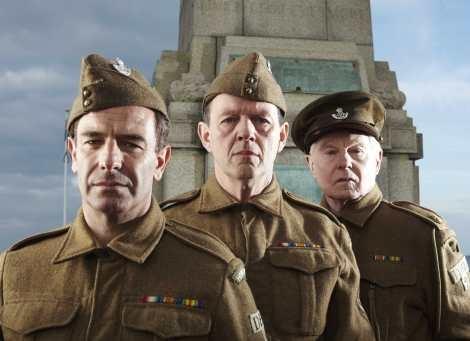Alan Plater wrote to the end. When he died earlier this year, he had completed a final screenplay which found him returning whence he came. Joe Maddison’s War was set in his native North-East, and portrayed the impact of wartime on ordinary working-class lives. With the help of nostalgic singing and dancing, the tone was comic and affectionate, but with an undimmed glint of good old socialist indignation. They don’t make dramas like this any more. But whenever they do, the more senior couch potatoes are entitled to lament once more the passing of Play for Today.
It’s quite a thing to write a drama about the war and have nothing much happen. Yes, Gerry flew over South Shields and dropped his beastly bombs. Geordies went off to fight and the Home Guard had a great deal more to do than they ever did in Dad's Army. But in Joe Maddison, Plater created a passive hero to whom things happen, rather than a proactive participant in his own destiny. And in Kevin Whately, who has long worked up pudding-faced plodders as if building ships from matchsticks, the right actor was found to embody him.Joe Maddison, like all his dockyard chums (chief among them Robson Green, as a chirpy crooner), was too old to fight in 1939. The memory of the trenches cast a long shadow over men drummed instead into the Local Defence Volunteers. Meanwhile a new front opened up domestically when, with no fireworks going off in the marital bed, Joe’s wife left him before the first commercial break.
Joe settled down to a life of stolid solitude, only to find himself set up with a widow (Melanie Hill) who lost her husband at Jutland. Soon Hitler had thrown them together in a nightraid, the toon started gossiping and they were an item before you could say Stalingrad. By D-Day his wife was back, with child, asking to be taken in. For once in his placid life, Joe had to make a decision.
Meanwhile, in a perky subplot, the dad's army went on strike after commanding officer Derek Jacobi objected to Robson Green’s singing. Good taste, you may think. One couldn’t possibly adjudicate, but the quondam member of Robson and Jerome certainly minded and duly gave Jacobi an insurrectionary clout in the nasal region. This may partly have been in retaliation for Jacobi’s Geordie accent, one of those RADA-trained efforts which veers all over the shop like an orienteering trip with a faulty compass.
Anyway, it was jolly jolly. Plater juggled all the relevant balls with the practised ease of a veteran. The pulse never threatened to break out of a gentle trot. You could say that’s autumnal romances on ITV on a Sunday evening for you, but this portrait of drab wartime lives had none of the asperity of, say, Victoria Wood’s Housewife, 49. Plater could bring himself to kill only one minor character in 90 minutes and six years of wartime. Perhaps he couldn’t bear to get rid of any of these final creations. Good gentle company to the last trump, bonny lad.














Comments
Add comment